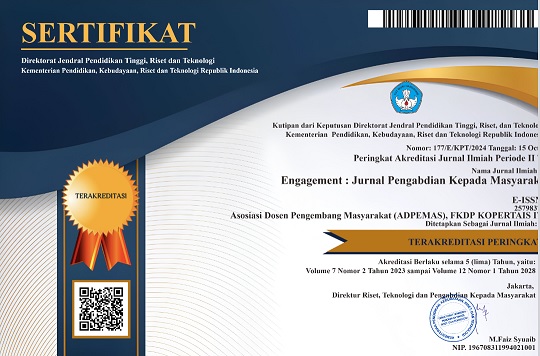Building an Environment That Motivates Education Sustainability in Tumbang Habaon Village, Gunung Mas, Central Kalimantan Province, During Pandemic through Participatory Action Research between Parents, Schools and Church
Abstract
An environment that does not motivate the sustainability of education is a central issue in Tumbang Habaon Village, Tewah District, Gunung Mas Regency. This issue is illustrated by the weak motivation of students to come to school to study, the lack of parental guidance for school-age children and the school's not being optimal in conducting effective learning for students, especially during the pandemic. This community cervice of Christian Religious Education Study Program aims to empower education sustainability through Participatory Action Research (PAR) approach between parents, schools and also church. The problems were found then designed in several action plan including 1) Parent’s role in fostering student motivation to continue their education through parenting seminar; 2) Fostering the motivation of Junior High School (SMPN 4 Tewah) to learn and directing them to have goals in their education process through “Kelas Inspirasi” activities; 3) Train teachers of SMPN 4 Tewah in Tumbang Habaon to be able to evaluate effective learning and have implications for student learning development through K’13 Assessment Instruments Training; 4) Christian Education in GKE Kapania Congregation in Tumbang Habaon as an effort to urge residents about the importance of education through Sunday School (SHM) and Youth Service (SPRP). Participatory Action Research which has been done, were carried out between parents, students, congregation members and stake holder in Tumbang Habaon had a new perspective on the importance of education for children’s future and also collaborative motivation between parents, schools and the community to support the sustainability of education for the children in Tumbang Habaon
Downloads
References
Afandi, Agus. Modul Participatory Action Research. Surabaya: IAIN Sunan Ampel, 2013.
Departemen Pendidikan Nasional. Undang-Undang Nomor 20 Tahun 2003 Tentang Sistem Pendidikan Nasional, 2006.
Hidayat, Mutik. “Pengaruh Kebiasaan Belajar, Lingkungan Belajar, Dan Dukungan Orang Tua Terhadap Prestasi Belajar Mata Pelajaran Ekonomi Pada Siswa Kelas Ix Ips Di Man Bangkalan.” Jurnal Ekonomi Pendidikan Dan Kewirausahaan 3, no. 1 (2017): 103.
Jumrawarsi, Jumrawarsi, and Neviyarni Suhaili. “Peran Seorang Guru Dalam Menciptakan Lingkungan Belajar Yang Kondusif.” Ensiklopedia Education Review 2, no. 3 (2021): 50–54.
Kusainun, Noven. “Analisis Standar Penilaian Pendidikan Di Indonesia.” Jurnal Keislaman dan Kemasyarakatan 4, no. 1 (2020): 134–154.
Padavick, J.F. “Parental Involvement with Learning and Increased Student Achievement.” Walden University Minneapolis, Minnesota, USA., 2015.
Prasetiawati, Prasetiawati, and Silvia Rahmelia. “IMPLEMENTASI SELF-DIRECTED LEARNING SISWA SMPN 7 PALANGKA RAYA DI MASA PANDEMI.” JURNAL PENDIDIKAN PEMBELAJARAN DAN PEMBERDAYAAN MASYARAKAT 3, no. 2 (2021): 194–2015.
Putri, B G R, M Irfan, and M B Santoso. “Upaya Peningkatan Kesadaran Pentingnya Melanjutkan Pendidikan Terhadap Anak Dan Remaja Putus Sekolah Di RT 04/RW 05 Kelurahan Kebon Kangkung Kota ….” Focus: Jurnal Pekerjaan Sosial 3, no. 2 (2020): 149–157.
Saumi, Nafisah Nor, Murtono Murtono, and Erik Aditia Ismaya. “Peran Guru Dalam Memberikan Motivasi Belajar Siswa Sekolah Dasar Pada Masa Pandemi COVID-19.” Jurnal Educatio FKIP UNMA 7, no. 1 (2021): 149–155.
Syachtiyani, Wulan Rahayu, and Novi Trisnawati. “Analisis Motivasi Belajar Dan Hasil Belajar Siswa Di Masa Pandemi Covid-19.” Prima Magistra: Jurnal Ilmiah Kependidikan 2, no. 1 (2021): 90–101.
Telaumbanua, Arozatulo. “Peranan Guru Pendidikan Agama Kristen Dalam Membentuk Karakter Siswa.” FIDEI: Jurnal Teologi Sistematika dan Praktika 4, no. 2 (2018): 103–111.
Tubulau, Imanuel. “Kajian Teoritis Tentang Konsep Ruang Lingkup Kurikulum Pendidikan Agama Kristen.” Jurnal Ilmiah Religiosity Entity Humanity (JIREH) 2, no. 1 (2020): 27–38.
Copyright (c) 2022 Engagement: Jurnal Pengabdian Kepada Masyarakat

This work is licensed under a Creative Commons Attribution-ShareAlike 4.0 International License.






.png)




